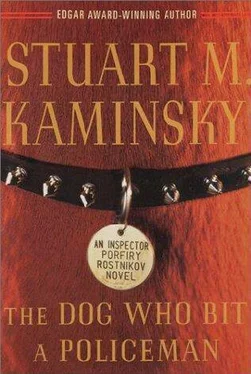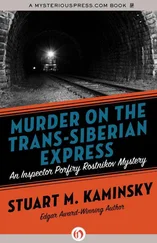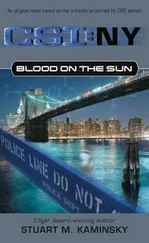Stuart Kaminsky - The Dog Who Bit a Policeman
Здесь есть возможность читать онлайн «Stuart Kaminsky - The Dog Who Bit a Policeman» весь текст электронной книги совершенно бесплатно (целиком полную версию без сокращений). В некоторых случаях можно слушать аудио, скачать через торрент в формате fb2 и присутствует краткое содержание. Жанр: Полицейский детектив, на русском языке. Описание произведения, (предисловие) а так же отзывы посетителей доступны на портале библиотеки ЛибКат.
- Название:The Dog Who Bit a Policeman
- Автор:
- Жанр:
- Год:неизвестен
- ISBN:нет данных
- Рейтинг книги:3 / 5. Голосов: 1
-
Избранное:Добавить в избранное
- Отзывы:
-
Ваша оценка:
- 60
- 1
- 2
- 3
- 4
- 5
The Dog Who Bit a Policeman: краткое содержание, описание и аннотация
Предлагаем к чтению аннотацию, описание, краткое содержание или предисловие (зависит от того, что написал сам автор книги «The Dog Who Bit a Policeman»). Если вы не нашли необходимую информацию о книге — напишите в комментариях, мы постараемся отыскать её.
The Dog Who Bit a Policeman — читать онлайн бесплатно полную книгу (весь текст) целиком
Ниже представлен текст книги, разбитый по страницам. Система сохранения места последней прочитанной страницы, позволяет с удобством читать онлайн бесплатно книгу «The Dog Who Bit a Policeman», без необходимости каждый раз заново искать на чём Вы остановились. Поставьте закладку, и сможете в любой момент перейти на страницу, на которой закончили чтение.
Интервал:
Закладка:
“That is the only explanation.”
There were many other explanations, as Karpo well knew. Rostnikov could have been threatened, bribed, ordered by a superior.
None of these possibilities was the least bit likely except the last.
Emil Karpo had no time for further speculation. Raisa Munyakinova had entered the small office and said, “Should I close the door?”
“Yes,” said Karpo, pointing to the chair from which Sergei had fled.
The woman closed the door and sat, looking up at the ghostly policeman, who now stood looking down at her from the other side of the desk she had dusted the night before.
Raisa Munyakinova could have been any age from forty to sixty.
She had the stoop-shouldered stance, the haggard and weathered face of the women who cleaned, baked, swept the streets, controlled crowds at theaters. They appeared interchangeable. Raisa was built like a block of concrete, generations of peasant stock, solid, reliable but eroding.
“Tell me about last night,” said Karpo.
“Mr. Lashkovich was killed,” she said softly, avoiding the policeman’s dark eyes.
“You saw him killed?”
“No. I was told this morning by Mr. Swartz, the hotel manager, who told me to come right away. I was asleep. I don’t get much sleep. I have many jobs.”
“You don’t work here full time?”
“No, I wish they would hire me. It would be so much easier than. .”
She trailed off and felt compelled to look at the somber white face above her.
“He was alive when you left?”
“Yes,” she said. “Sergei had already gone. I had done the shower floor and walls. They were mildewed, but I know how.”
“There was a man here with Lashkovich when you left.”
“Yes,” she said, nodding her head for emphasis.
“What did he look like? What did you hear?”
“The man was big, dark. He wore one of those light coats, tan.
He kept his hands in his pockets. He and Mr. Lashkovich argued while Mr. Lashkovich swam.”
“What did they argue about?”
“I’m not sure,” she said. “I couldn’t hear much in the shower and I tried to stay away from the pool. Mr. Lashkovich swam without any clothes on. He did not care if I saw him. Their voices were angry. The man in the tan coat was particularly loud and angry.”
“Would you recognize this man in the tan coat?” asked Karpo.
“I. . I don’t want to get in trouble,” she said. “I am frightened.”
“The man in the tan coat is almost certainly the one who killed Lashkovich. Don’t you want him caught?”
“I don’t care if he is caught,” she said sadly. “Mr. Lashkovich was good to me, left me tips, but I know he was in a Mafia, that he was a murderer. Let Sergei identify the man.”
“Sergei did not get a good look at him, or at least that is what he says.”
“I don’t know,” said Raisa, her eyes growing moist. “Whoever the man was, he might kill me if I identify him.”
“He may decide to kill you and Sergei anyway, to keep you from identifying him. Your best hope for safety is to identify him so we can arrest him. We have photographs you can look at.”
“I don’t know,” the woman said again. “I’m all alone. I work hard. I don’t want trouble.”
“What we want and what we must do are often quite different,” said Karpo.
The woman sat silently, looking at her thick hands and shaking her head. “All right,” she said finally with a huge sigh. “I’ll identify him if I can. When, where?”
“At Petrovka,” Karpo said. “We have photographs of members of various Mafias. We will start there.”
“We will start there,” Raisa repeated. “They will kill me. I know they will.”
“They will not,” said Karpo.
Something about the certainty with which the ghostly detective spoke made Raisa look up at him. What she saw and felt was a man who kept his word. She was a woman who also kept her word. She had little else left to her.
Night was falling. In the small cafe on Gorky Street, a young man with a baby face fingered the white scar on his nose, drank coffee very slowly, and spoke even more slowly. The two men with him, both considerably older, listened carefully, showing their full attention.
There was something both comic and frightening about the scene, but other patrons did their best not to pay attention or at least to disguise the fact that they were paying attention. It was something all Russians, particularly those who lived in Moscow, learned how to do at a very early age.
“Suspicious behavior,” said Illya.
“Very,” added Boris.
“I want the woman eliminated,” said Peter Nimitsov calmly.
“She may be innocent,” said Boris.
“I want her dead,” Nimitsov said.
“The Ukrainian will be upset,” said Illya.
“Do you want to argue with me, Illya Skatesholkov?” asked the young man with the baby face.
“No,” Illya responded immediately. “She will die. I just. .”
“Make it an accident,” said Nimitsov. “And if the Ukrainian protests, then he will also have an accident.”
“He could bring us a new market for the dogs,” said Boris.
“Then let us hope we do not have to kill him,” said Peter Nimitsov.
And so the fate of Elena Timofeyeva, known to those at this table as Lyuba Polikarpova, was determined.
Porfiry Petrovich was tired. His day had been long, and for one of the few times in his adult life he did not look forward to the weights and he hoped that no neighbors were waiting for him with problems concerning their plumbing. Usually, lifting weights and fixing the neighbors’ plumbing were respites from his days of confronting increasingly random violence, stupidity, lies, and the deep Russian sadness of the lives of those who either chose to or felt they had to engage in criminal activity. And then there were the insane, who were often cunning, often operating with little motive that made sense. But worst of all were the victims. His nightmares, when he had them, were not of grisly murder scenes and wild or cringing killers, but of the blank, confused faces of the victims, at least those who managed to survive.
But what now troubled Rostnikov most-besides the corruption that had not ceased with the end of Communism-was the rise of the gangs, the Mafias. Their power had increased. Their battles for territory and profits from prostitution, drugs, extortion, and gambling had moved to the streets. It was not, as so many of the Moscow news media were fond of saying, like Chicago in the 1920s. Rostnikov knew about Chicago. These gangs were animal survivalists, and the worst of them were the ones whose leaders conducted themselves like princes. Casmir Chenko, Glahz, the one-eyed Tatar, was like that. But the man he had met with earlier that evening had been a very different prince from the cautious Tatar.
Unlike Chenko, the Chechin Shatalov had made no elaborate plans involving car switching and public places. He had simply called Rostnikov and told him to meet him at the Pizza Hut on what was once Leningradskaya, the name with which Shatalov, himself, referred to the location. The Pizza Hut was one of the first American fast-food restaurants in Moscow. It had come well before the collapse of Communism and had been a success from its first opening.
Rostnikov had taken a red bus from Petrovka. He found it faster, though he had increasing difficulty keeping up with the hurrying and not even slightly considerate crowds. His useless leg had slowed him in the past, and now his artificial one was a problem.
Though he was slow, Rostnikov’s solid muscular body and arms opened holes in the crowds where none existed. He always moved firmly and resolutely, trying to keep from causing injury to his determined fellow passengers.
Читать дальшеИнтервал:
Закладка:
Похожие книги на «The Dog Who Bit a Policeman»
Представляем Вашему вниманию похожие книги на «The Dog Who Bit a Policeman» списком для выбора. Мы отобрали схожую по названию и смыслу литературу в надежде предоставить читателям больше вариантов отыскать новые, интересные, ещё непрочитанные произведения.
Обсуждение, отзывы о книге «The Dog Who Bit a Policeman» и просто собственные мнения читателей. Оставьте ваши комментарии, напишите, что Вы думаете о произведении, его смысле или главных героях. Укажите что конкретно понравилось, а что нет, и почему Вы так считаете.












